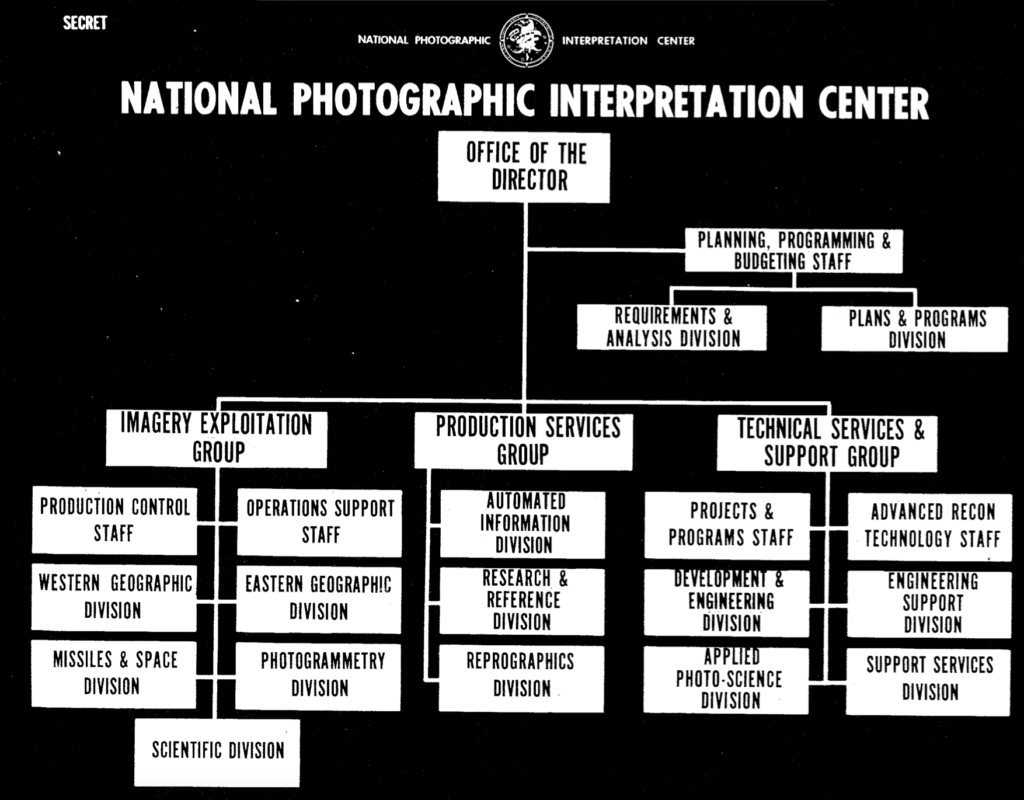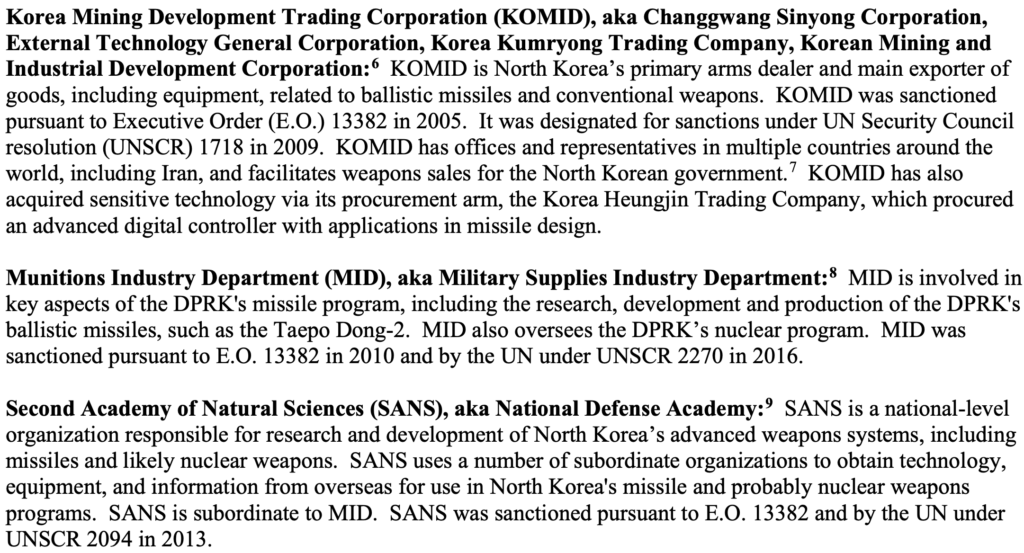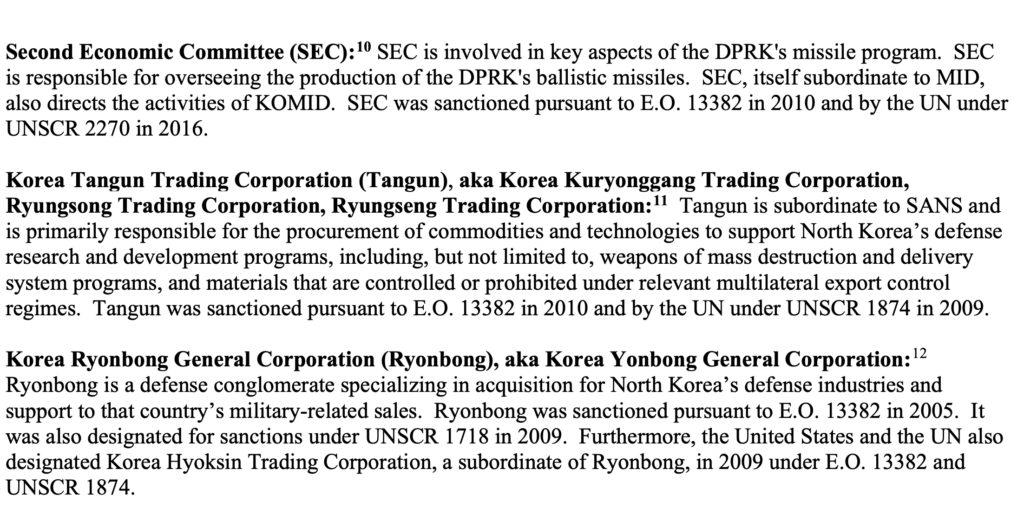Here’s a random document...an organizational chart from (I think) 1969 of the National Photographic Interpretation Center.


Here’s a random document...an organizational chart from (I think) 1969 of the National Photographic Interpretation Center.

This 1982 CIA memo to President Reagan is titled “Peace Groups and Leaders in INF Basing Countries.” Here’s the final paragraph of the Overview:

The November 1979 NSC memo cited in this volume of FRUS (about which I blogged yesterday) explains “Soviet variables in the power equation in Iran.”
I’ll confess that I hadn’t previously heard this one:
our demonstrated weakness in the present crisis not only has adverse effects on our allies in the region but also in Europe and East Asia. If we do nothing, the credibility of our nuclear deterrent posture is thrown into question
This edition of FRUS contains an interesting foot =note describing an August 1980 Soviet exercise of which I was unaware:
According to an August 2 CIA brief, the Soviet Union had carried out a command
post exercise in the Transcaucasus Military District in the last week of July. This exercise was the first simulated ground and air operation against Iran since the overthrow of the Shah. The exercise posited Iran as the primary enemy and included the rapid movement of troops across Iran, the use of air power, and the contingency use of tactical nuclear weapons. The objective of the scenario was the Persian Gulf area. On August 6, a CIA brief reported that a second command post exercise simulating a Soviet invasion of Iran had occurred.
The Departments of Commerce, State, and the Treasury recently issued this advisory on N Korean ballistic missile procurement. Two useful features:


In a recent interview, David Smith mentioned the 1971 USS Enterprise’s movement into the Indian Ocean as a persistent source of Indian mistrust:
The principal reason for such a persistent level of mistrust over time is obviously the U.S. relationship with Pakistan. This relationship has been on a sharply downward trajectory since 2011, but that fact seemed not to have made any discernible impact on Indian students’ perception of the direction of the U.S.-India relationship. The difficulty of forgiving and overcoming these slights is likely due to the strength of persistent historical memory in South Asia. Even after 70 years, the experience of partition continues to poison India-Pakistan relations and in large measure still fuels the Kashmir insurgency. Another example is the USS Enterprise sortie into the Indian Ocean in 1971, which continues to be seen by India as a nuclear threat made by the United States. In all four decades of the study period, the Enterprise incident repeatedly resurfaced as the classic example of American perfidy, symbolizing perhaps an unspoken fear that in the event of a future war with Pakistan the United States would intervene similarly to deny India the fruits of victory.
All of this excerpt from Eco’s 1977 guide on writing a thesis is worth your time. Here’s an example:
Do not pretend to be Dante by saying that the poetic fury “dictates deep within,” and that you cannot surrender to the flat and pedestrian metalanguage of literary criticism. Are you a poet? Then do not pursue a university degree.
In a comment on this post, Pavel Podvig was kind enough to provide a link to a 2016 S&GS article titled On the Origins and Significance of the Limit Demarcating Low-Enriched Uranium from Highly Enriched Uranium.
I noticed something interesting (to me, anyway).
Here’s what State’s 2019 compliance report said about Chinese proliferation:
CONDUCT GIVING RISE TO ADHERENCE CONCERNS
Chinese entities continued to supply MTCR-controlled goods to missile programs of proliferation concern, including those in Iran, North Korea, Syria, and Pakistan in 2018.
ANALYSIS OF ADHERENCE CONCERNS
In November 2000, the People’s Republic of China (China) made a public commitment not to assist “in any way, any country in the development of ballistic missiles that can be used to deliver nuclear weapons (i.e., missiles capable of delivering a payload of at least 500 kilograms to a distance of at least 300 kilometers).”
Chinese entities continued to supply MTCR-controlled goods to missile programs of proliferation concern, including those in Iran, DPRK, Syria, and Pakistan in 2018.
China’s Assistance to Iran
Nowhere is the current challenge posed by missile proliferation and the expansion of missile capabilities more clear than in the case of Iran. Iran possesses the largest missile program in the Middle East and continues to work to increase the size, sophistication, range, accuracy, and lethality of its missile arsenal. It is developing an array of solid and liquid propellant short-range and medium-range ballistic missile systems, and continues to push to expand its capabilities.
We also remain concerned about the continuing ties between Chinese suppliers, and missile development efforts in places such as Iran – especially the activities of the infamous Chinese missile technology broker and fugitive from justice Karl Lee (a.k.a. Li Fangwei). Lee continues to shelter in China while serving as the most important overseas supplier of items and material for Iran’s missile program. Lee is a key broker for Iran’s ballistic missile program and provides significant assistance in supporting Iran’s ongoing efforts to develop more sophisticated missiles. The equipment and components that Lee has provide to Iran have contributed to Iran’s continued development of more sophisticated missiles with improved accuracy, range, and lethality.
Despite a warrant out for his arrest, and more than a decade of imposing sanctions on Lee under the Iran, Syria, and North Korea Nonproliferation Act (INKSNA), including most recently in April 2018, the Chinese government, to date, has not taken effective action to end his proliferation activity.
*snip*
Separately, throughout 2018, the United States raised a number of cases with China concerning transfers of missile technology by Chinese entities to programs of concern in Iran, Syria, North Korea, and Pakistan.
There’s a bit more, but that’s the most important part.
Here’s what the 2020 report says about the same topic:
CONDUCT GIVING RISE TO ADHERENCE/COMPLIANCE CONCERNS
Chinese entities continued to supply MTCR-controlled goods to missile programs of proliferation concern in 2019.
Additional information is provided in the higher classification Annex.
ANALYSIS OF ADHERENCE/COMPLIANCE CONCERNS
In November 2000, the People’s Republic of China (China) made a public commitment not to assist “in any way, any country in the development of ballistic missiles that can be used to deliver nuclear weapons (i.e., missiles capable of delivering a payload of at least 500 kilograms to a distance of at least 300 kilometers).”
Chinese entities continued to supply MTCR-controlled goods to missile programs of proliferation concern in 2019.